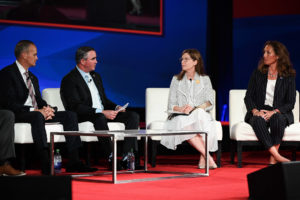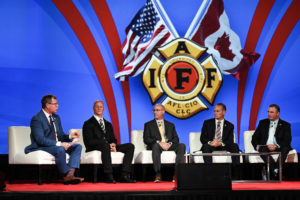
General President Edward Kelly and General Secretary-Treasurer Frank Líma led the discussion with American Cancer Society (ACS) CEO Dr. Karen Knudsen, Canadian Cancer Society (CCS) CEO Andrea Seale, IAFF Canadian Trustee Alex Forrest, Chief Operations Officer (CFO) for the Firefighter Cancer Support Network (FCSN) Joe Schumacher, and IAFF Director of Science and Research Neil McMillan.
The IAFF has long been pulling out all the stops to protect its members from cancer and to assist them when they are diagnosed with cancer. The union recently developed a partnership with the ACS which will lead to more fire fighter-specific cancer research and additional access to life-saving resources like affordable cancer screenings.
“We have to go where the fight is,” said Dr. Knudsen. “Fire fighters are disproportionately affected by cancer. What we really need to do is to conduct research to pinpoint what triggers cancer in fire fighters. But that will take some time. What we can do now is to offer resources and help fire fighters diagnosed with cancer get treatment.”
Seale, the CCS CEO agreed. “We have thousands of cancer cases in Canada every year due to on-the-job exposures,” she said. “More data is needed to improve prevention strategies, but right now our organization provides a plethora of resources including a help line and free lodging if you have to travel for cancer treatment.”

“We offer mentors who are either fire fighter cancer survivors or spouses of cancer survivors,” says FCSN Chief Operations Officer Joe Schumacher, a member of Fairfax Local 2702 and three-time cancer survivor. “We also provide a tool kit which includes a guidebook that helps fire fighters every step of the way from diagnosis to remission.”
The future of the fight against cancer is with research. New IAFF Director of Science and Research Neil McMillan, a member Ottawa Local 162, said, “We need to know more about how fire fighters get cancer and what happens in the body once cancer is present. A broadened understanding leads to more effective prevention and treatment strategies.”
The International Agency for Research on Cancer (IARC), an arm of the World Health Organization (WHO), just classified the firefighting profession as a Group 1 carcinogen.
“Everything the IAFF has been saying about the extreme risk fire fighters have of developing cancer is now confirmed,” said IAFF Canadian Trustee Alex Forrest. “Our members can now take this ruling and successfully lobby for the passage of cancer presumption laws in areas they could not before.”
Another implication of the IARC ruling could be with access of cancer screenings. Roundtable panelists suggested that IAFF members talk to their doctors about the ruling to see if earlier screenings for certain cancers might be warranted.